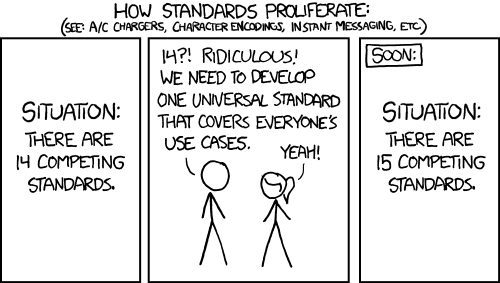Why are there so many programming languages? And why are there still being so many made? I would think you would try to perfect what you have instead of making new ones all the time. I understand you need new languages sometimes like quantumcomputing or some newer tech like that. But for pc you would think there would be some kind of universal language. I’m learning java btw. I like programming languages. But was just wondering.
you would think there would be some kind of universal language

well … we all know the perfect programming language was created way back in 1960
(What do (you) mean? ( Lisp certainly has its (downsides) and (upsides)))
(do (What) (you mean))
(has Lisp (and (its downsides) (its upsides)))[Lisp would be a VSO language]
You can not perfect old languages, since there are a lot of features that you can not add on or change afterwards, OP. Not in a worthwile way. This is not a philosophical question, it wasn’t for a lack of trying. And since there aren’t enough skilled people in this niche, fashion driven field, expect history to repeat itself and some langs at best get 60 to 80% right.
You cannot perfect old languages. And you cannot write a new language without making architectural errors. And any new language that deviates significantly from what has gone before will only ever see niche success.
Thus what we have today is the best we can expect: gradual evolution of new languages, and gradual improvement of old languages. Neither has any particular advantage, but the industry as a whole keeps grasping at the eternal straw of the ‘silver bullet’ language that new languages promise.
Like human languages, you get different types of expressiveness in different ways. If you know multiple languages whether is python or Java, or English and French / Spanish / German, you’ll see that there are positives and negatives to each language.
Lots of people want to design the best combination of them all, using the newest tools and newest tech to create something as useful as possible.
Relevant XKCD: https://xkcd.com/927/
Sort of… But new languages make use of new tech and compilers usually.
And old languages add features and adapt or rewrite the compiler for new technologies. There’s no inherent advantage to a language being new.
Less technical debt
Less experience in what programmers actually want or need from a language.
Partly because sometimes a particular language suits a particular problem set.
Partly because people just like writing computer languages.
But mostly because people mistake the fundamental problem of programming, which is programming is really hard. So someone comes along and thinks “Programming is really hard, it must be a problem with the languages available” and sets out to write a computer language that makes programming easy.
But all that happens is they trade one set of difficulties for another set of difficulties. They might succeed in making writing the initial version easier, but make maintaining that code harder. Or they might solve some memory allocation problems, but create performance issues.
Either way, someone will write a language because they think they will help solve the issue of programming being hard, and fail. Because the really hard bit about programming is about understanding everything the program needs to do, in microscopic detail, and translating that into a structure that best fits the problem; not the actual coding itself.
We should make one programming language to rule them all!







